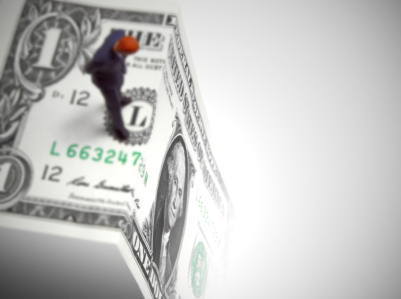
By Joel Dresang
Uncertainty reigns. Executives fault it for lower earnings forecasts. Analysts cite it in dramatic stock sell-offs. Pollsters blame it for plummeting consumer sentiment.
Since mid-January, Google financial searches have contained the word “uncertainty” more than any time in the last five years – including the COVID-19 pandemic.
“Investors hate uncertainty,” financial professionals often say. It’s a truism, like “A bird in the hand is worth two in the bush.” If given a choice between something known and whatever’s behind the door where Carol Merrill is standing, we take comfort in certainty. Uncertainty, we shun.
At the same time, emerging research finds wisdom in uncertainty.
“(A) wave of new scientific discoveries reveals that learning to lean intouncertainty in times of rapid change is a promising antidote to mental distress,” writes Maggie Jackson, a journalist and best-selling author. “A growing body of evidence and a range of new interventions suggest that skillfully managing uncertainty in the face of what’s murky, new or unexpected is an effective treatment for anxiety, a likely path to building resilience and a mark of astute problem-solving ability.”
Learn more
The Recipe for Childlike Wonder: Uncertainty, an interview with Maggie Jackson,from WBUR-FM
Uncertainty: The surprising gift of being unsure,an interview with Maggie Jackson,from the John Templeton Foundation
The importance of humility in investing, a Money Talk Video with Art Rothschild
Balance beats timing (and uncertainty), by Kyle Tetting
Staying ready for uncertainty, by Joel Dresang
Wisdom and wonder
What Jackson explains in her book, “Uncertain: The Wisdom and Wonder of Being Unsure,” suggests long-time investors should not freak out or shy away in times of uncertainty. Instead, they should expect the unexpected, have a plan, and take a breath.
Imagine being one of the two NASA astronauts who went to the International Space Shuttle for a 10-day mission and got stranded there for nine months. To most of us, that would be a Twilight Zone nightmare. But Suni Williams and Butch Wilmore were trained to be adaptive. Confronted with an abrupt change in plans, they made the most of their outer space flight delay.
“It makes you really want to enjoy every bit of your time that you have up here,” Williams said in an interview the week before she and Wilmore were brought back to Earth.
Having a plan
Similarly, investors with diversified portfolios designed for both long-term expectations and occasional surprises can withstand and even benefit from market uncertainty, Kyle Tetting noted in a recent Money Talk Podcast. In fact, Harry Markowitz, referred to his Nobel prizewinning work on balancing assets as “the theory of rational behavior under uncertainty.”
When uncertainty sent stocks stumbling in March, Kyle said, many individuals faced the sell-off with investment plans featuring a mix of equities for growth and bonds for stability.
“The role that that plan plays ultimately is to say here’s what happens when we’re not confident in what’s going to happen next,” Kyle said. “It doesn’t mean we don’t have some ideas about where we think it’s headed. It doesn’t mean that long term we don’t have some expectation of what we’d like to accomplish. But we’ve also got to figure out how do we navigate the next three months, six months, a year. And that’s where the bonds come in. It’s where the safer piece of the portfolio comes in. It’s where diversification plays such a critical role. And it’s why having that plan really is the key.”
Humility
Having a plan is an exercise in humility. It acknowledges that no one knows for sure what the future brings.
“Being humble doesn’t mean not taking action,” Kyle said. “It doesn’t mean just accepting everything that gets thrown our way and never doing anything different. It does, however, mean that we have to be cognizant of what we don’t know. And sometimes there are things we don’t know we don’t know.”
Staying open to uncertainty – and being ready to discover opportunity in it – runs counter to human nature and popular culture, according to Jackson. But there are ways of becoming more attuned to unpredictability. She says simply varying your personal routines – to make your daily life less unsurprising – can help you get more comfortable with uncertainty.
Also, researchers Jackson interviewed have found that the internet and smartphones (certainty-seeking devices, she calls them) are making us less tolerant of the unknown. We’re more apt to panic when things don’t happen as we expect rather than taking a moment to study the situation and wondering why and imagining what to do.
Knowledge updates
“Our uneasy sense of not knowing triggers a host of beneficial neural changes, including heightened attention, bolstered working memory and sensitivity to new information,” Jackson wrote in The New York Times. “The brain is preparing to update our knowledge of the world.”
And lately, our brains have craved such updates.
“We are very much in that environment,” Kyle said, noting the back-and-forth on U.S. trade policies, federal government cuts and other political changes that have left private economists, market analysts and central bankers scratching their heads over the consequences.
“Clearly, we’ve seen some opportunity in some of that change,” Kyle continued, “and we’ve seen risk in other areas. That does mean we’re going to have to be nimble. It means we’re going to have to make changes over time reflecting areas of opportunity and risk. But it also means that maybe the first thing to do isn’t just to dive in heads first.”
In other words, investors shouldn’t be stunned by market disruptions but let their plans allow them to take a breath, touch base with their advisor and get used to uncertainty.
“There’s more uncertainty to come,” Kyle said, “as there always is.”
Joel Dresang is vice president-communications at Landaas & Company, LLC.